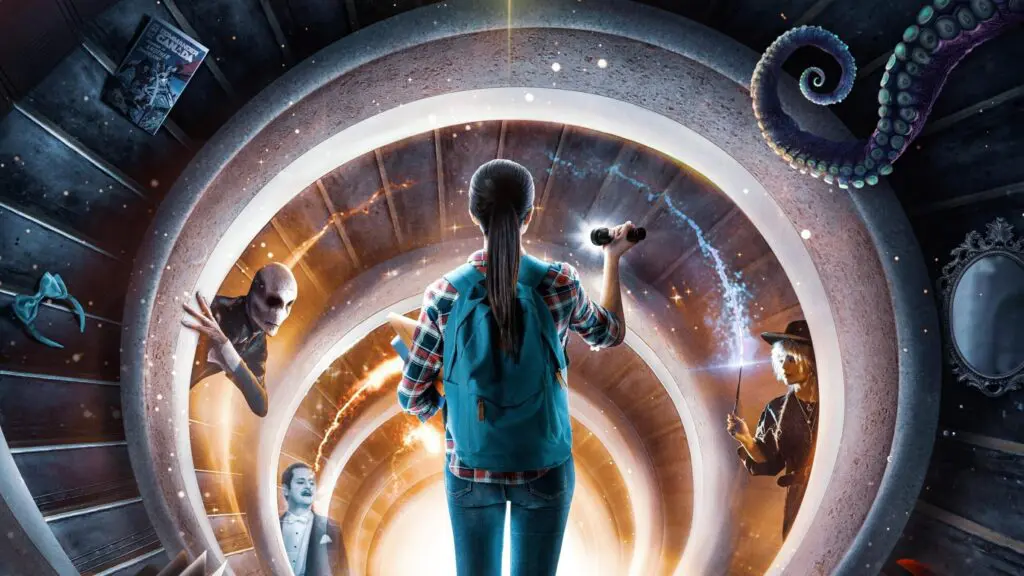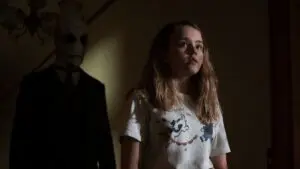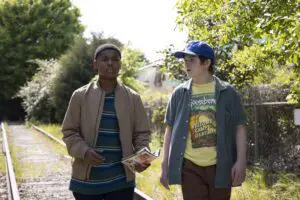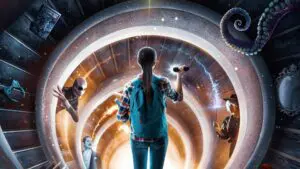Summary
Like all anthologies, Just Beyond has its ups and downs, but for the most part, it’s a meaningful examination of YA themes with one truly stand-out episode.
R.L. Stine is primarily known for Goosebumps, but the prolific American author – who has been dubbed “the Stephen King of children’s literature”, a weird moniker if you know anything about Stephen King – has dreamed up hundreds of sanitized nightmares for younger readers. Netflix’s surprisingly good three-part adaptation of Fear Street was one of his, and Disney’s anthology series Just Beyond is another.
Just Beyond Season 1 Review and Plot Summary
Playing like a family-friendly Twilight Zone, these eight paranormal tales are pretty well-suited to the Halloween season, even if there aren’t many scares to be found here. With each episode running for around 30 minutes, most ending on a twist, and virtually all containing a thinly veiled lesson that’ll resonate with the target audience, there’s probably something for everyone here, even if only one episode, the last, truly stands out.
That isn’t to say the others are bad, just less memorable. All share a baseline quality of acting and so-so visual effects, and the half-hour runtime leaves most of them feeling a bit compressed, but there’s plenty of variety.
Episode 1, “Leave Them Kids Alone” is set in a strict school for “difficult” girls, where a budding activist finds herself at odds with the principal; Episode 3, “Which Witch?” is a high-school drama with a touch of the supernatural; and so on, and so forth. The moral and social underpinnings are sometimes sledgehammer-subtle, but that’s fine for the target demographic. It’s better for each episode to actually be about something beyond the superficial, and I respect that the show goes out of its way to make sure everyone gets the point it’s making.
Some episodes, such as Episode 5, “Unfiltered”, about a bookish girl corrupted by the promise of beauty, and Episode 7, “Standing Up For Yourself”, a quintessential story about a bully getting his comeuppance, feel too bound by familiar trappings to really surprise.
But I liked Episode 2, “Parents Are From Mars, Kids Are From Venus” a lot for its ambiguity and constant turns, while Episode 4, “My Monster” definitely gets the most mileage out of classic horror imagery and tropes. That’s the only episode that might qualify as genuinely scary, at least for the target demo, but it builds to a nice and uplifting conclusion.
It’s the final episode, “The Treehouse”, that is really worth the price of admission though. It’s a powerful, extremely well-acted study of grief and loss, with a fluid comic book logic that builds to a payoff that left a real lump in my throat. Even if all the other episodes were terrible (which they’re not!) it’d be hard not to recommend Just Beyond on the strength of this little story alone.
As things stand, what Disney+ have provided here is a gateway into the world of genre storytelling as a bridge between reality and fiction; stories as a Rosetta Stone for the human experience. It’s flawed and inconsistent, but it’s also sincere and worthwhile if you’re willing to meet it halfway.
Just Beyond Season 1 Episode 1 Recap

Just Beyond Season 1 Episode 1 (Credit – Disney+)
Disney’s idea of high school is a pretty well-established concept; the kind of place where kids all wear headphones listening to something that completely summarizes their personality. “Leave Them Kids Alone”, the first episode of the horror-comedy anthology Just Beyond, opens with this gimmick, so as soon as we see Veronica Vanderhall (Mckenna Grace) listening to pop-rock and wearing badges on her jacket, we just know she’s a self-styled activist even before she starts lecturing people about the planet dying.
Unfortunately, the punishment for inciting minor rebellions in Disney high schools is being shipped off to Miss Genevive’s School for “difficult” girls, where everyone has the same uniform, haircut, and personality. Everything is fine!
Veronica doesn’t fit in at her new school, to say the least. There are no vegan options on the breakfast menu and no mention in history class of how the Salem witch trials were rooted in misogyny and oppression.
Miss Genevive (Nasim Pedrad) wants her brought in line, and her hair appropriately styled, as soon as possible, which prompts a hasty escape attempt and a quick allyship with Claire (Leean Ross), a fellow student who has been planning an escape attempt of her own and takes Veronica to see the haircut process for herself, which takes place in a lab rather than a salon. It’s brainwashing, essentially, but it doesn’t work on Claire, since she has a metal plate in her head after a skateboarding accident in her youth.
Claire has a sister named Mary (Jasmyn Renee Coleman) who has succumbed to the brainwashing, which is why she remains behind at the school. The parents don’t seem to have any idea what’s going on there, but they don’t seem to be questioning it much either, which isn’t exactly a well-hidden point about wealthy parents who ship their offspring off to “special” schools rather than having to deal with them.
The next day, Claire has been brainwashed, the plate in her head having been “discovered” in a kind of hand-wavey “don’t worry about it” way. This leaves Veronica without allies, and suddenly seeing the allure of not having to care about anything; the burden, I suppose, of those who care too much about everything.
But it doesn’t last long, since a window of opportunity presents itself in Heather (Lauren Lindsey Donzis), her roommate. As it turns out, music instantly undoes the brainwashing, so Veronica’s little speaker — a throwback to the opening scene, smartly — blasting pop-rock snaps Heather right out of it. And then Heather playing the music through the school’s intercom system snaps everyone out of it. The girls are free, and there’s an immediate uprising.
“Leave Them Kids Alone” is a tame opener, you have to admit, but you can see how it’d work much better in a longer format with its relationships and twists stretched out over more time.
There are no scares, per se — the “horror” is in children being forced into obedience and conformity instead of being allowed to express themselves — but there’s definitely the skeleton of an idea here.
What did you think of Just Beyond Season 1, and Episode 1? Comment below.




